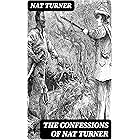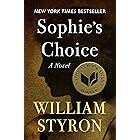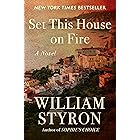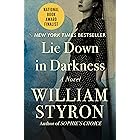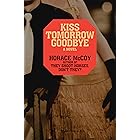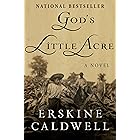| Kindle Price: | $2.99 |
| Sold by: | Amazon.com Services LLC |
Your Memberships & Subscriptions

Download the free Kindle app and start reading Kindle books instantly on your smartphone, tablet, or computer - no Kindle device required.
Read instantly on your browser with Kindle for Web.
Using your mobile phone camera - scan the code below and download the Kindle app.

OK
The Confessions of Nat Turner: A Novel Kindle Edition
The “magnificent” Pulitzer Prize–winning and #1 New York Times–bestselling novel about the preacher who led America’s bloodiest slave revolt (The New York Times).
The Confessions of Nat Turner is William Styron’s complex and richly drawn imagining of Nat Turner, the leader of the 1831 slave rebellion in Virginia that led to the deaths of almost sixty men, women, and children. Published at the height of the civil rights movement, the novel draws upon the historical Nat Turner’s confession to his attorney, made as he awaited execution in a Virginia jail. This powerful narrative, steeped in the brutal and tragic history of American slavery, reveals a Turner who is neither a hero nor a demon, but rather a man driven to exact vengeance for the centuries of injustice inflicted upon his people.
- LanguageEnglish
- PublisherOpen Road Media
- Publication dateMay 4, 2010
- File size6175 KB
Customers who bought this item also bought
Editorial Reviews
Review
“Magnificent. . . . A triumph.” —The New York Times“A wonderfully evocative portrait.” —Book World“A first-rate novel.” —The New York Review of Books
About the Author
William Styron (1925–2006), born in Newport News, Virginia, was one of the greatest American writers of his generation. Styron published his first book, Lie Down in Darkness, at age twenty-six and went on to write such influential works as the international bestseller Sophie’s Choice.
Product details
- ASIN : B00B06NAAA
- Publisher : Open Road Media (May 4, 2010)
- Publication date : May 4, 2010
- Language : English
- File size : 6175 KB
- Text-to-Speech : Enabled
- Screen Reader : Supported
- Enhanced typesetting : Enabled
- X-Ray : Enabled
- Word Wise : Enabled
- Sticky notes : On Kindle Scribe
- Print length : 487 pages
- Best Sellers Rank: #116,522 in Kindle Store (See Top 100 in Kindle Store)
- #183 in Classic American Fiction
- #318 in Classic Literary Fiction
- #537 in Biographical Fiction (Books)
- Customer Reviews:
About the author

William Styron (1925-2006) , a native of the Virginia Tidewater, was a graduate of Duke University and a veteran of the U.S. Marine Corps. His books include Lie Down in Darkness, The Long March, Set This House on Fire, The Confessions of Nat Turner, Sophie's Choice, This Quiet Dust, Darkness Visible, and A Tidewater Morning. He was awarded the Pulitzer Prize for Fiction, the Howells Medal, the American Book Award, the Legion d'Honneur, and the Witness to Justice Award from the Auschwitz Jewish Center Foundation. With his wife, the poet and activist Rose Styron, he lived for most of his adult life in Roxbury, Connecticut, and in Vineyard Haven, Massachusetts, where he is buried.
Customer reviews
Customer Reviews, including Product Star Ratings help customers to learn more about the product and decide whether it is the right product for them.
To calculate the overall star rating and percentage breakdown by star, we don’t use a simple average. Instead, our system considers things like how recent a review is and if the reviewer bought the item on Amazon. It also analyzed reviews to verify trustworthiness.
Learn more how customers reviews work on Amazon-
Top reviews
Top reviews from the United States
There was a problem filtering reviews right now. Please try again later.
The Confessions of Nat Turner, By William Styron
Kindle Edition (434 Pages)
This historical fiction novel, by William Styron, reimagines the life of Nat Turner, an enslaved African American mystical preacher who led a slave revolt in Virginia.The Nat Turner's Rebellion of 1831 (also known as the Southampton Insurrection) is the only sustained slave insurrection recorded in the history of the United States. Beginning on Sunday evening, August 21,1831, Nat Turner and a small group of his rebel slaves followers first murdered Turner's master and his family members, in Southampton County, Virginia. They than preceded to neighboring farms and plantations killing all white men, women, and children they encountered, while gathering weapons and additional followers. The rebels killed an estimated 55 people, at least 51 of who were white, before the rebellion was suppressed less than two day latter. During the suppression at the Belmont Plantation, on the morning of August 23, 1831, Turner escaped capture and hid in the woods. In the aftermath of the short battle at Belmont Plantation, the state tried the slaves accused of being part of Turner's rebellion in a special court: 18 were executed (hanged), 14 were transported to various plantations in the lower South, and a few were acquitted. Turner continued to evade pursuers until October 30, when he was discovered by farmer Benjamin Phipps while hiding in a hole covered with fence rails. Awaiting trial, Turner is alleged to have confessed his knowledge of the rebellion to attorney Thomas Ruffin Gray, who compiled what he claimed was Turner's confession. Turner was tried on November 5, 1831 for "conspiring to rebel and making insurrection", convicted, and sentenced to death. On November 11, Turner was hanged in Jerusalem, Virginia. His body was flayed and beheaded as an example to frighten other would-be rebels. Turner received no formal burial; his headless remains were reportedly buried in an unmarked grave.
“The Confessions of Nat Turner,” published in Richmond early 1832 by attorney Grey represents all that is known about Nat and his motivations and much of this is incorporated into Styron's narrative, along with factual history regarding the the attitudes, conditions, techniques and practices associated with the institution of slavery, as they existed in the South in the late 18th and early 19th Century. Styron imagines Nat from his childhood as a house slave on a large plantation, owned by an "enlightened" slaveholder, and follows Nat's life from his comparatively privileged (for a slave) beginnings, through his gradual awakening to his true existence as a slave, and finally to his development into a 31 year old, radicalized, messianic preacher and leader of a bloody insurrection. The end result a realistic portrayal of a intelligent, thinking, human being in revolt against a cruel, dehumanizing, and demeaning oppression. This book, in my opinion, stands as literature's most scathing and eloquent indictments of slavery in America. This is a historical novel, by definition a work of fiction, which allows the author a great amount of freedom in imagining characters innermost thoughts, motivations, and nature, while operating within the confines of historical facts. Accordingly, I believe the author is less concerned with historical detail, and much more interested in portraying the human costs for all involved in the institution of slavery and its impact on the minds, bodies, souls, and the entire social fabric. Using words and phrases like an artist painting a masterpiece, Styron's narrative is compelling and evocative, as it draws the reader into Nat's nightmarish life as a slave. While reading, I kept asking myself how would I have adjusted to the life of a slave (clearly a question the author hoped his readers might ask themselves). The narrative also presents compelling discussion regarding the reasons why people who can profess a belief in freedom and equality were able to rationalize enslaving another group of people who happened to have a different skin color. This is one of most thought provoking and elegantly written novels will ever read.
Note that there is a great deal of controversy surrounding this book. Winner of the 1967 Pulitzer Prize for Fiction and quickly becoming a best seller, the novel was released during the height of the Civil Rights movement. It soon came under harsh criticism from African American leaders and intellectuals. They seemed to primarily question the ability of a white southerner author to address the character and motivations of an African American slave. As a white person myself, I cannot question or hope to satisfactorily answer their concerns. What I do know is that this novel presents Nat Turner as a human being, struggling against the oppression of a inhuman institution, in a manner I personally found extremely effective. Perhaps other readers can have the same experience.
Ultimately though, one has to judge the book on its own merits, right? Without question, Styron writes well. His prose is enjoyable to read in this as well as his other books. In historical fiction, though, characterization and authenticity are important. And the choices he makes for his (version of the) protagonist are questionable. Perhaps predictably, my big questions center on those choices that invited the most controversy in the book's early days. Namely, is there any reason to throw in a homosexual incident? It doesn't seem to fit the character we're watching. Would an educated Nat really have had rape fantasies about a white woman? Is the implication that it's in his nature?
You see? One is immediately drawn into the socio-political issues. They're hard not to think about. But here's an even more challenging question. Would I (or anyone else) object to the choices made had Styron's friend James Baldwin made them? I feel like I end up projecting my own take on slavery and race relations onto the book, including all the baggage that comes with that. Unfortunately, that makes this review so subjective as to be not very valuable. As a sidebar, I wonder if this book has come to be seen as ground zero for the intellectual movement against so-called cultural appropriation?
For what it's worth, I'd recommend reading the book.
The book is a flashback of Nat's life, and Styron reconstructs the truth-based facts from Thomas Gray's Confessions, and included his own interpretation of what drove Nat to the violence, and why. Styron's narrative is masterful, and it's a book that I couldn't put down, as the language is almost mesmerizing.
Styron was criticized at the time of publication, as well as lauded, and the major accusation was that no white man could presume to know what a black slave thought and why he acted as he did. I personally think that William Styron read the autobiography of Frederick Douglass, where Douglass talks about the psychology of the slave, and the effect that slavery has on a human being. If this is the case, the Styron's narrative is probably quite accurate, in its portrayal of slave life and psychology. I read this book many years ago and loved it, and just recently re-read it - it is one of those books one can't forget.
The beginning is a little slow, as it is the language used by Thomas Gray the lawyer, and it is quite dense - a characteristic of the times. But nontheless, the story picks up rather rapidly and is engrossing and thought-provoking.
Top reviews from other countries
History books didn't always give e this account from the black persons perspective.




